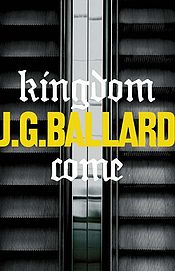Posted on July 7th, 2009 at 1:35 pm by Agent B

Some words from the late J.G. Ballard:
“People feel they can rely on the irrational. It offers the only guarantee of freedom from all the cant and bullshit and sales commercials fed to us by politicians, bishops and academics. People are deliberately re-primitivizing themselves. They yearn for magic and unreason, which served them well in the past, and might help them again. They’re keen to enter a new Dark Age. The lights are on, but they’re retreating into inner darkness, into superstition and unreason. The future is going to be a struggle between vast systems of competing psychopathologies, all of them willed and deliberate, part of a desperate attempt to escape from the rational world and the boredom of consumerism.”
“Our streets are the cable TV consumer channels. Our party insignia are the gold and platinum loyalty cards. Faintly risible? Yes, but people thought the Nazis were a bit of a joke. The consumer society is a kind of soft police state. We think we have choice, but everything is compulsory. We have to keep buying or we fail as citizens. Consumerism creates huge unconscious needs that only fascism can satisfy. In anything, fascism is the form that consumerism takes when it opts for elective madness. You can see it here already.” (page 105)
These three interlinked concepts of consumerism, mental illness, and fascism are woven through the entire narrative.
“Now. I see you as tomorrow’s man. Consumerism is the door to the future, and you’re helping open it. People accumulate emotional capital, as well as cash in the bank, and they need to invest those emotions in a leader figure. They don’t want a jackbooted fanatic ranting on a balcony. They want a TV host sitting with a studio panel, talking quietly about what matters in their lives. It’s a new kind of democracy, where we vote at the cash counter, not the ballot box. Consumerism is the greatest device anyone has invented for controlling people. New fantasies, new dreams and dislikes, new souls to heal. For some peculiar reason they call it shopping. But it’s really the purest kind of politics.” (page 145)
And in this dystopia, as with others you might know, the ugliest aspects of human behavior surface at a surprising rate.
“Who needs liberty and human rights and civic responsibility? What we want is an aesthetics of violence. We believe in the triumph of feelings over reason. Pure materialism isn’t enough, all those Asian shopkeepers with their cash-register minds. We need drama, we need our emotions manipulated, we want to be conned and cajoled. Consumerism fits the bill exactly. It’s drawn the blueprint for the fascist states of the future. If anything, consumerism creates an appetite that can only be satisfied by fascism. Some kind of insanity is the last way forward.” (page 168)